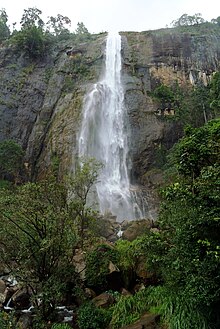Uva Province
Uva Province
ඌව පළාත ஊவா மாகாணம் | |
|---|---|
 View from Ella Gap | |
 Location within Sri Lanka | |
| Coordinates: 6°35′24″N 81°01′48″E / 6.59000°N 81.03000°E | |
| Country | Sri Lanka |
| Created | 1886 |
| Admitted | 14 November 1987 |
| Capital | Badulla |
| Largest City | Badulla |
| Districts | List |
| Government | |
| • Type | Provincial council |
| • Body | Uva Provincial Council |
| • Governor | Kapila Jayasekera |
| Area | |
• Total | 8,500 km2 (3,300 sq mi) |
| • Rank | 4th (12.92% of total area) |
| Population (2011 census) | |
• Total | 1,266,463 |
| • Rank | 8th (6.3% of total pop.) |
| • Density | 150/km2 (390/sq mi) |
| Gross Regional Product (2021)[1] | |
| • Total | Rs. 922 billion |
| • Rank | 7th (5.2% of total) |
| Time zone | UTC+05:30 (Sri Lanka) |
| ISO 3166 code | LK-8 |
| Vehicle registration | UP |
| Official Languages | Sinhalese Tamil |
| Flower | Gurulu raaja (Rhynchostylis retusa) |
| Website | www |
The Uva Province (Sinhala: ඌව පළාත, romanized: Uva Paḷāta, Tamil: ஊவா மாகாணம், romanized: Uvā Mākāṇam) is one of the nine provinces of Sri Lanka. The province has an area of 8,500 km2 and a population of 1,266,463, making it the 2nd least populated province. The provincial capital is Badulla.
Uva is bordered by the Eastern, Southern, Sabaragamuwa, and Central provinces. It is home to several tourist attractions, waterfalls and two national parks: Yala National Park and Gal Oya National Park.
History
[edit]Uva's provincial history records an 1818 uprising (also known as the Third Kandyan War) against the British colonial government which had been controlling the formally independent Udarata (Sinhalese: Up-Country), of which Uva was a province. The uprising was led by Keppetipola Disawe, a rebel leader celebrated by the Sinhalese even today, who was sent initially by the British government to stop the uprising.[citation needed] The rebels managed to capture Matale and Kandy before Keppetipola fell ill and was captured and beheaded by the British. His skull was abnormal, as it was wider than usual, and was sent to Britain for analysis. It was returned to Sri Lanka after independence, and now rests in the Kandyan Museum.[2]
The rebellion, which soon developed into a guerrilla war of the kind the Kandyans had fought against European powers for centuries, was centred on the Kandyan nobility and their unhappiness with developments under British rule since 1815. However, it was the last uprising of its kind. In the Uva Province, a scorched earth policy was pursued, and all males between 15 and 60 years were driven out, exiled or killed. The British Crown annexed the Kingdom of Kandy to British Ceylon in 1817.[3][4]
Geography
[edit]The Uva province has an area of 8,500 km2 and a population of 1,259,880.
Uva is home to several major tourist attractions, like the waterfalls of Dunhinda falls, Diyaluma Falls, and Rawana Falls, and the Yala National Park (lying partly in the Southern and Eastern Provinces) and Gal Oya National Park (lying partly in the Eastern Province).
The Gal Oya hills and the central mountains are the main uplands, while the Mahaweli (Sinhalese: great-sandy) and Menik (Sinhalese: gemstone) rivers and the huge Senanayake Samudraya and Maduru Oya Reservoirs are the major waterways of the province.
Mountains
[edit]Uva's symbolic mountain is Namunukula, which stands tallest among the mountain range surrounding Badulla. The highest mountain in the Uva Province is Totapolakanda, which lies on the border with the Nuwara Eliya District.[5] There are views of the Welimada basin, Katharagama and Hambantota from Namunukula peak on a clear day.
The Haputale-Beragala gap gives a view of the Southern and Sabaragamuwa provinces on a clear day.
Administrative divisions
[edit]Districts
[edit]Uva is divided into 2 districts:
| District | Capital | Area (km2) | Population |
|---|---|---|---|
| Badulla District | Badulla | 2,861 | 815,405 |
| Monaragala District | Monaragala | 5,639 | 451,058 |
Divisional secretariats
[edit]The districts of the Sri Lanka are divided into administrative sub-units known as divisional secretariats. These were originally based on the feudal counties, the korales[what language is this?] and ratas[what language is this?]. They were formerly known as "D.R.O. Divisions" after the Divisional Revenue Officer. Later the D.R.O.s became Assistant Government Agents and the Divisions were known as "A.G.A. Divisions". Currently, the Divisions are administered by a Divisional Secretary and are known as "D.S. Divisions".
There are 26 divisional secretariats in the Uva Province. There are 15 in the Badulla District and 11 in the Moneragala District.
Major cities and towns
[edit]


See also
[edit]References
[edit]- ^ ".Provincial Gross Domestic Product (PGDP) - 2021 -->" (PDF). Retrieved 14 June 2023.
- ^ Müller, J. B. (6 November 2010). "Anglophiles, Eurocentric arrogance and Reality". The Island.
- ^ Müller, J. B. (6 November 2010). "Anglophiles, Eurocentric arrogance and Reality". The Island.
- ^ Keerthisinghe, Lakshman I. (2013). "The British duplicity in protecting human rights in Sri Lanka". Daily Mirror. Archived from the original on 21 October 2013. Retrieved 21 October 2013.
- ^ "Thotupola Kanda".











